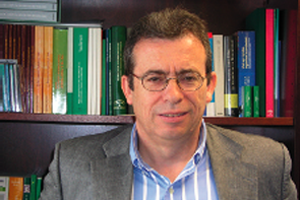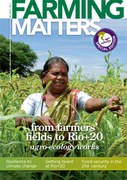Manuel Gonzalez de Molina – Manuel Gonzalez de Molina Navarro works as Professor in the Department of Contemporary History at the University Pablo de Olavide (Seville), where he directs the Laboratory of Agro-ecosystems History. He proposes the use of “social metabolism” as a tool and perspective to describe and analyse the relationship between nature and the production processes – and to develop more sustainable food systems.

Manuel Gonzalez de Molina NavarroTogether with Victor Manuel Toledo, a researcher at the Autonomous University of Mexico, Dr Gonzalez de Molina recently published “Metabolisms, nature and history: Towards a theory of socio-ecological transformations”, which presents the social metabolism approach and argues that it is a powerful tool for analysing the relationship between man and nature.
Studies on social metabolism have gained ground in the last decade. What new conceptual and methodological contributions do they represent?
The theoretical and methodological proposal of social metabolism fills a major gap. We needed a conceptual tool that was common to the various disciplines that study the environment. In the same way that hybrid disciplines such as agro-ecology have arisen out of the marriage between different sciences, social metabolism is also a hybrid theory which combines the social and the natural sciences, including ecology, economics, history, sociology, thermodynamics, etc. For reasons of cognitive economy and to facilitate understanding among different specialists, transdisciplinarity requires common conceptual tools for examining the complexity of the interactions between society and nature.
In what ways can agricultural metabolism analysis be useful for redesigning food systems?
The application of social metabolism to agro-ecosystems has given rise to the concept of “agricultural metabolism”, which is an extremely useful tool for studying agricultural sustainability. With it you can integrate not only environmental and agronomic, but also economic and social aspects, that is, the institutional arrangements that facilitate or hinder the achievement of sustainability. The metabolic approach to farming also allows us to distinguish the different scales (crop, farm, local, national or global) at which action is needed to achieve and maintain sustainability over time and especially to provide a perspective on ways to offset the environmental crisis in the countryside.
For example, in Spain we have applied this approach to the food system (see No. 10 of Revista de Economía Crítica: http://revistaeconomiacritica. org/) and the data are conclusive: agriculture is only responsible for one third of the primary energy used in feeding the Spanish. The remaining two thirds are used in the transportation, processing, storage and cooking required by a food chain in which there are huge distances between producers and consumers. Even within agriculture, the production of synthetic nitrogen, the use of concentrated feed made with raw materials that come from far away and fuel consumption, account for almost 90% of energy consumption.
The study revealed three important things for the design of a sustainable food system: first, the Spanish way of eating is very costly in environmental terms and is beyond our resources, so the first objective of an alternative proposal should be to drastically reduce the amount of energy consumed. Second, it is not only food production that is unsustainable, but also our consumption patterns, which require the investment of enormous amounts of energy and materials. And third, substituting organic inputs for chemical ones will not be enough to increase the sustainability of the system. If we want to substantially reduce the energy cost of feeding the Spanish we need a form of agroecological management that closes the cycles and uses local and renewable sources of energy.
From the point of view of socio-ecological metabolism, what analysis can be made of the ideas being proposed at the rio +20 conference?
Many international organisations have promoted the socalled “green economy” as an attempt to respond to growing social demands for a more sustainable economy. Some states and large corporations have seen a great business opportunity in this “new economy”. However, the implementation of this type of economy will not solve the ecological crisis. This green economy is based on the market-mediated replacement of dirty technologies by clean ones without making any profound socio-economic changes. The underlying idea is that the crisis will be overcome by successively increasing the efficiency of our use of energy and materials, which will be driven by relative prices and the self-regulated functioning of the markets.
It is unclear, however, whether this model supposes a reduction in the already high consumption of natural resources, especially in rich countries. As early as the nineteenth century Jevons warned us that successive gains in efficiency in the use of a resource could paradoxically lead to higher consumption of it. Sustainability cannot be achieved without a social change that puts a new economic model in place. This is clearly part of the agro-ecological approach, whose strong conception of sustainability not only proposes agronomic and technical solutions, but also economic and political changes. Indeed, without these changes there can be no guarantee that technological innovation will develop along the right track.
For example, difficulties in reaching an agreement limiting the emission of greenhouse gases and thus mitigating climate change is not just a problem of the political will of governments, it is also a problem of the rules of the game. There is a lack of regulations and incentives that make it viable for economic operators to use the available sustainable technological alternatives or develop new ones. Without an institutional framework that encourages short channels of food distribution, for example, a sustainable food system is impossible. The way the food markets are currently regulated clearly favours long channels and an inequitable relationship between farmers and food distributors.
How can this analytical approach support the development of institutional arrangements favourable to a transition from agri-food systems towards an agroecological approach?
The metabolic proposal is also an excellent political tool. By showing the critical points within the food system, it points out the main objectives of action to social movements and the orientation of public policies to governments. In fact, by integrating physical and biological aspects with social and economic rights, the theoretical and methodological approach of social metabolism becomes an ideal basis to provide the necessary political approach to agro-ecology.
For an institutional design to be favourable to food sustainability, it must be based on a rigorous analysis of reality, which is possible with the metabolic approach. While the ecological footprint is an educational tool that calculates the impact of the food system in ecological terms, the metabolic methodology is a powerful tool that helps to describe in physical terms all the processes taking place from the farm to the final consumer. This allows us to locate the sources of unsustainability within the food system and identify the economic agents who benefit from its current configuration. This will enable the design of rigorous and effective public policies to move us along the path towards sustainability.
Interview: Paulo Petersen

